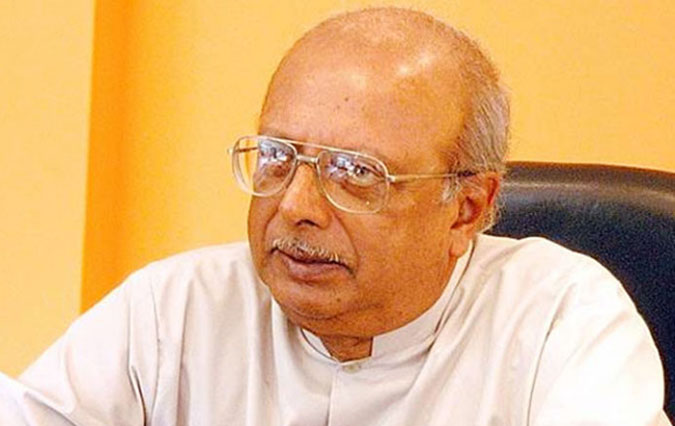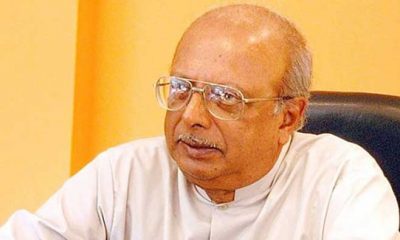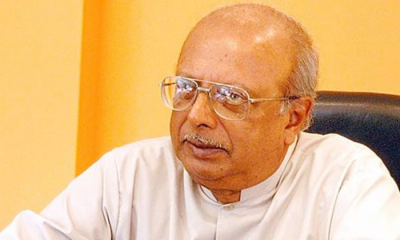News
LSSP blames neoliberal policies for present crisis

Leader of the Lanka Sama Samaja Party (LSSP) Prof Tissa Vitarana says that the current crisis is due to a shrinking economy and high inflation.
“There is a lack of both dollars and of rupees. The lack of dollars is a result of the neoliberal policies of successive governments, since 1978, which raised our foreign debt to US$ 52 billion and brought down our foreign exchange (forex) reserves from US$ 8 billion to a few millions. The worst offender was the “Yahapalana” government of 2015, led by Ranil Wickremesinghe, which borrowed $ 12.5 billion,” Prof Vitarana says, in a message to mark the LSSP anniversary that falls tomorrow (20)
“When the LSSP is commemorating its 87th Anniversary, I send this message to our friendly people with a feeling of deep sadness. Most of the people of Sri Lanka are facing great hardships at this time of severe economic, social and political crisis. More than 65 % of families, whose income is below the poverty line, are going hungry, the parents having one meal a day so that the children can have two. This too is lacking in protein, vitamins and essential elements Even if they manage to get rice, only about 50% of their protein needs are obtained. This mainly affects the children and the malnutrition levels among them exceed 20%, so that the future generations, too, will suffer with poor physical and mental development. Due to the contraction of the economy many small and medium industries are closing down or cutting staff. Unemployment is rising steeply. Everyone is suffering due to the electricity power cuts, the shortage and high prices of food, fuel, gas and medicines. Thousands of educated youth that the country needs are leaving our shores. Many who remain are enticed to become drug addicts and prostitutes.
“Action taken by Dr.N.M.Perera of the LLSSP, as Finance Minister, to solve the severe 1972/3 crisis provides the basis for a solution. Then the shortage of essential imports and the price rise was higher than today (e.g. the import of a ton of sugar rose from 43 British pounds to 600). He prevailed on the PM, Sirimavo Bandaranaike, to impose severe restrictions on imports and promoted exports to solve our adverse balance of payments situation. He imposed high taxes (75%) on the rich who did not invest their capital for development so that the Government could play a leading role in overcoming the crisis, reduce poverty and develop the country. He promoted science and technology to develop a national economy that would be self-sufficient and increase exports. There were no indirect taxes like VAT that passed the burden of the crisis on to the people, specially the poor. He brought down inflation by strengthening and linking the producer and consumer cooperatives, and strengthened the role of the food and marketing departments, eliminating exploitation by the traders and middlemen. By 1975 he produced a surplus Budget and raised the Foreign Exchange Reserve from USD 1 billion to nearly 4 billion, and restored normalcy, overcoming the crisis.
“The current crisis is due to a shrinking economy and high inflation. There is both a lack of Dollars and of Rupees for the Government. The lack of Dollars is a result of the neoliberal policies of successive governments since 1978 which raised our foreign debt to US$ 52 billion and brought down our foreign exchange (forex) reserves from US$ 8 billion to a few millions. The worst offender was the “Yahapalana” government of 2015, led by Ranil Wickremasinghe, which borrowed $ 12.5 billion. The dollar crisis is due to an annual debt servicing cost, which last year was $ 6.3 billion. It was not due to an adverse foreign trade balance, as our forex earnings in 2021 were $ 21 billion, exceeding our import cost of $ 20 billion by one billion. I am glad that the SLPP Government stopped the import of vehicles and the present Government has banned the import of a large list of non-essential imports. If this is properly done there will be no need to borrow further from the multilateral donors, led by the IMF, and get further into debt, and also have to sell our valuable assets. We can escape the debt trap and have the dollars to get the fuel, fertiliser, gas, food and medicines that the people need, keeping the price down, by properly run Sathosas, Cooperatives, etc. A five-year moratorium on debt will give us $ 35 billion to develop value-added industries using our agricultural and natural resources (ilmenite and graphite) to provide jobs for our youth. The technology will be provided to SMEs through the Vidatha Centres at Divisional level and Hi-Tech at central level e.g. SLINTEC nanotechnology) with emphasis on exports.
“Immediate action must be taken to bring down the cost of living. Left Government policies must be combined with empowerment of the people. Properly elected producer and consumer Co-operatives will ensure that the producer gets a proper price while the consumer cost is minimized. The middlemen exploitation is eliminated. Low interest credit for farmers and entrepreneurs from the Central Bank Fund could be made available through the Rural Banks and Vidatha Centres. The problem of rural microcredit at high interest must be overcome. Farmers will be supported to practice ecoagriculture. All failed state and private institutions could be run under the “solidarity economy” principle, where the lease/ ownership will be in the hands of the workers, who alone get the profits, having one share each in the company. Through these and other measures it will be possible to recover from this crisis, as Dr. N M Perera did in 1972/3. Sri Lanka can emerge from this crisis, eliminate poverty and become a developed country if a progressive Government which implements the above LSSP policies comes to power. I invite all honest people who accept these policies to join us to get rid of poverty and make Sri Lanka a developed country.
“The LSSP was formed in 1935 and led the fight for national independence. The LSSP was banned and its leaders like Dr N M Perera and Dr. Colvin R de Silva jailed. They broke jail and escaped to India where they joined the independence struggle led by Gandhi and Nehru, as part of the Congress Socialist Party. They returned at the end of the war in 1945 and led the General Strike of 1947 in which the Police fired at Dr. N M Perera, but comrade Kandasamy who was by his side died. The Great Hartal of 1953 was led by the LSSP against the raising of the price of rice by the UNP Government from 25 cents a measure to 72 cents. When anti-Tamil racism was at its worst and Sinhala only was made the official language the LSSP fought for Tamil also to be made official. Yhis was finally granted in 1957. Sri Lanka became a truly independent sovereign state with the passing of the Republican Constitution drafted by Dr. Colvin R de Silva in 1972.”
News
US sports envoys to Lanka to champion youth development

The U.S. Embassy in Colombo welcomed the U.S. Sports Envoys to Sri Lanka, former National Basketball Association (NBA) and Women’s National Basketball Association (WNBA) players Stephen Howard and Astou Ndiaye, from June 8 through 14.
The Public Diplomacy section of the U.S. Embassy said that it would launch a weeklong basketball program intended to harness the unifying power of sports, made possible through collaboration with Foundation of Goodness and IImpact Hoop Lab.
While in Sri Lanka, Howard and Ndiaye, both retired professional basketball players, will conduct a weeklong program, Hoops for Hope: Bridging Borders through Basketball. The Sports Envoys will lead basketball clinics and exhibition matches and engage in leadership sessions in Colombo and Southern Province for youth aged 14-18 from Northern, Uva, Eastern and Western Provinces, offering skills and leadership training both on and off the court. The U.S. Envoys will also share their expertise with the Sri Lanka Basketball Federation, national coaches, and players, furthering the development of basketball in the country. Beyond the clinics, they will collaborate with Sri Lankan schoolchildren to take part in a community service project in the Colombo area.
“We are so proud to welcome Stephen and Astou as our Sports Envoys to Sri Lanka, to build on the strong people-to-people connections between the United States and Sri Lanka,” said U.S. Ambassador Julie Chung. “The lessons that will be shared by our Sports Envoys – communication, teamwork, resilience, inclusion, and conflict resolution – are essential for leadership development, community building, equality, and peace. The U.S. Sports Envoy program is a testament to our belief that sports can be a powerful tool in promoting peace and unity.”
News
Rahuman questions sudden cancellation of leave of CEB employees

SJB Colombo District MP Mujibur Rahuman in parliament demanded to know from the government the reasons for CEB suspending the leave of all its employees until further notice from Thursday.
MP Rahuman said that the CEB has got an acting General Manager anew and the latter yesterday morning issued a circular suspending leave of all CEB employees with immediate effect until further notice.
“We demand that Minister Kanchana Wijesekera should explain this to the House. This circular was issued while this debate on the new Electricity Amendment Bill was pending. There are many who oppose this Bill. The Minister must tell parliament the reason for the urge to cancel the leave of CEB employees,” the MP said.However, Speaker Mahinda Yapa Abeywardena prevented Minister Wijesekera responding to the query and said that the matter raised by MP Rahuman was not relevant.
News
CIPM successfully concludes 8th Annual Symposium

The Chartered Institute of Personnel Management (CIPM) successfully concluded the 8th Annual CIPM Symposium, which took place on 31st May 2024. Themed “Nurturing the Human Element—Redefining HRM in a Rapidly Changing World,” the symposium underscored the pivotal role of human resource management (HRM) in today’s dynamic global landscape. Since its inception in 1959, CIPM has been dedicated to advancing the HR profession through education, professional development, and advocacy, solidifying its position as Sri Lanka’s leading professional body for HRM.
Ken Vijayakumar, the President of the CIPM, graced the occasion as the chief guest. The symposium commenced with the welcome address by the Chairperson, Prof. Arosha Adikaram, followed by the Web Launch of the Symposium Proceedings and Abstract Book by the CIPM President. The event featured distinguished addresses, including a speech by Chief Guest Ken Vijayakumar, President of CIPM, and an address by Guest of Honor Shakthi Ranatunga, Chief Operating Officer of MAS Holdings Pvt. Ltd., Sri Lanka.
The symposium also featured an inspiring keynote address by Prof. Mario Fernando, Professor of Management and Director of the Centre for Cross Cultural Management (CCCM) at the University of Wollongong, Australia.
Vote of Thanks of the inauguration session was delivered by Dr. Dillanjani Weeratunga, Symposium Co-chair.
The symposium served as a comprehensive platform for researchers to present their findings across a wide range of critical topics in HRM. These included Cultural Diversity and Inclusion, Talent Development and Retention, Ethical Leadership and Corporate Social Responsibility, Adapting to Technological Advancements, Mental Health and Well-being at Work, Global Workforce Challenges, Employee Empowerment, and Reskilling and Upskilling.
The plenary session was led by Prof. Wasantha Rajapakse. Certificates were awarded to the best paper presenters during the valedictory session, followed by a vote of thanks delivered by Kamani Perera, Manager of Research and Development.
The annual symposium of CIPM was a truly inclusive event, attracting a diverse audience that spanned undergraduates, graduates, working professionals, research scholars and lecturers. This widespread interest highlights the symposium’s significance in the field of HRM, offering a unique opportunity for everyone to network and learn from scholarly brains.The CIPM International Research Symposium was sponsored by Hambantota International Port, Sri Lanka Institute of Information Technology (SLIIT), E B Creasy & Co. PLC, and Print Xcel Company.
















